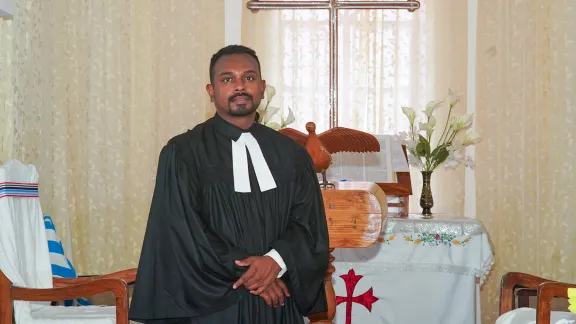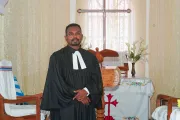
Rev. Anup Indwar, Gossner Evangelical Lutheran Church pastor, and Assistant Professor at the Gossner Theological College, India. Photo: Private
College tutor and pastor shares the contribution of LWF training program in shaping future church leaders
Since January this year, I have been serving as a faculty member at the Gossner Theological College, in Ranchi, India, where I teach Christian Theology. But my work is not confined to the classroom. Every Sunday, I engage in pastoral ministry within the Adivasi community of the eastern state of Jharkhand. This dual role allows me to intertwine my academic interests with practical ministry, creating a comprehensive approach to my work.
As a recipient of a scholarship from The Lutheran World Federation (LWF) for the academic years 2021-2023, I have also had the opportunity to participate in the capacity building and leadership development activities of the LWF scholarship program. I recently joined an online training workshop that offered deep insights into the multifaceted nature of effective leadership. The resource persons, experts in their respective fields, provided valuable perspectives on leadership, particularly in the context of multicultural and religiously diverse settings.
My studies focus on Adivasi Baganiyar Theology. One of my primary theological concerns is the contextualization of Christian theology in India—a country characterized by its vast religious and cultural diversity. Christianity, having been introduced from the West, must be adapted to address Indian realities such as poverty, economic inequality, gender inequality, and the coexistence of multiple religions like Hinduism, Islam, Buddhism, and Jainism.
Let me highlight some key elements about leadership that I learnt from the LWF training.
- Active listening: Leadership involves the ability to listen actively and empathetically.
- Human fallibility: Leaders can and do make mistakes; it’s a part of being human.
- Contemporary leadership values: Good leadership today requires involving all generations and standing firmly for justice.
In India, theology must embrace tolerance and prioritize justice, recognizing that each faith has its truth. The Indian context demands inclusivity and justice, principles that are also central to the Christian gospel.
The knowledge and skills I gained are proving invaluable in my current role as a seminary instructor, where I am tasked with shaping future church leaders.
Rev. Anup Indwar, Assistant Professor, Gossner Theological College, India
Social, economic, political and spiritual challenges
Through my pastoral work, I aim to empower the Adivasi community, helping individuals express themselves and advocating for social justice. The Christian gospel, with its strong emphasis on inclusivity and justice, serves as a powerful tool in this endeavor. It is my mission to apply these principles to address social, economic, political, and spiritual challenges within my community.
As a member of the Adivasi Oraon ethnic group, I have a deep commitment to uplifting my community, which has long been deprived of basic rights such as healthcare, education, nutrition, and shelter. My academic focus on Adivasi Theology—a branch of Contextual and Liberation Theology—reflects my dedication to addressing these issues.
Dialogue and exchange of ideas
The LWF training program also emphasized the importance of dialogue and the exchange of ideas with participants from various regions. The knowledge and skills I gained are proving invaluable in my current role as a seminary instructor, where I am tasked with shaping future church leaders. My background as an Adivasi and my theological education continue to drive my commitment to justice and inclusivity.



